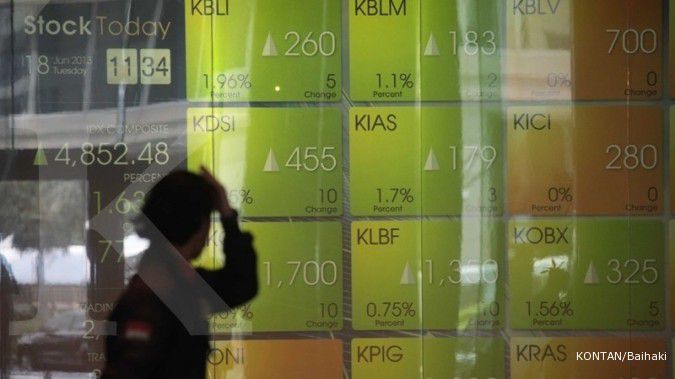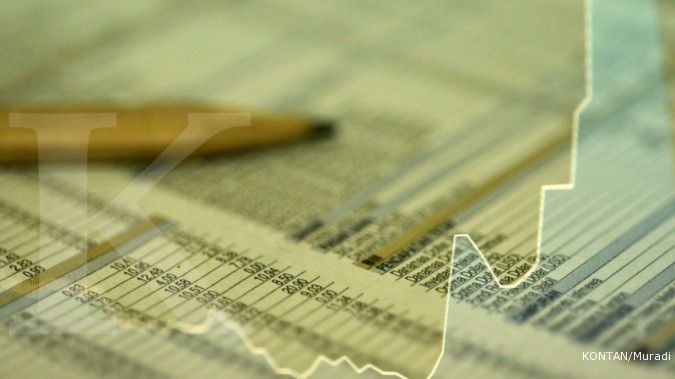JAKARTA. An outflow of “hot money” parked in Indonesian stocks and bonds shook the market on Monday after global fund managers sold their investments in emerging economies, including Indonesia.
The massive outflows were triggered by concerns over Argentina’s ongoing financial crisis and China’s slow economic recovery, causing the Jakarta Composite Index (JCI) to plunge 2.6 percent on Monday to close at 4,322.78, its steepest one-day decline in five months.
Argentina, which is on the brink of default, recently devalued its peso after the currency fell by almost 13 percent in two days. Investors quit the South American country, which had allegedly manipulated its inflation rate of around 28 percent with the government claiming it was only 11 percent.
Meanwhile, the Asian economic giant’s manufacturing sector contracted for the first time in six months, according to the latest HSBC Purchasing Manager Index (PMI), signaling a lagging recovery in Indonesia’s biggest export destination.
“The degree of disappointment in the recovery in China continues to affect portfolio inflows to emerging markets,” Callum Henderson, the global head of foreign exchange research with Standard Chartered, said in Jakarta on Monday.
The London-based bank predicted the JCI would decline to 4,000 by the year end due to the “underweight” outlook of rupiah assets as Indonesia’s high current-account deficit might warrant further interest rate hikes, which in turn would erode companies’ earnings.
Globally, Indonesian equities were the worst-performers among the 13 countries in the red on Monday, according to the World Benchmark Indices Comparison data compiled by the Indonesian Stock Exchange.
Property and mining stocks led the losses, both declining by 3.3 percent. Banking stocks also weighed on the market, with Bank Central Asia (BBCA) and Bank Mandiri (BMRI) becoming the bourse’s top two laggards, each tumbling by 3.7 percent and 4.3 percent, respectively.
Indonesia suffered the worst from the fallout because the JCI had been the region’s strongest advancer in recent days, inciting profit-taking among investors, said Universal Broker Indonesia analyst Satrio Utomo.
The bourse’s new rules regulating prices and lot size of shares also affected sentiment, he added.
Meanwhile, the prospect of further tapering of US quantitative easing also spooked fund managers.
Senior officials from the US Federal Reserve will decide on it when they convene for a two-day meeting on Tuesday — the last meeting for outgoing governor Ben Bernanke, who is seen as less dovish than his successor Janet Yellen.
Indonesia is seen as the country that would suffer the most from the tapering of the quantitative easing.
The rupiah was included on the list of “fragile five” currencies most vulnerable to capital outflows, according to the US-based Morgan Stanley.
The rupiah tumbled 0.4 percent to touch 12,230 per US dollar as of 4:58 p.m. on Monday in Jakarta, Bloomberg reported compiling prices from local banks.
Indonesia’s bonds, which earlier this month were among the best performers in Asia, had swung into the worst-performer as well. On Monday, the yield on the government’s 10-year bonds dropped 40 basis to 9.18 percent — the lowest in three years — according to the Inter Dealer Market Association.
A 9 percent yield for rupiah bonds should be attractive enough for fixed-income investors to return to the market and draw inflows, Ezra Nazula, a fixed-income analyst with Manulife Aset Manajemen Indonesia, said in a phone interview.
This is because inflation, a major factor determining returns on bonds, will remain on the downward trajectory, though it might spike slightly this month due to bad weather, according to Ezra. (Satria Sambijantoro)
Market rout as ‘hot money’ exits RI
January 29, 2014, 08.45 AM
/2013/04/11/1411464450p.jpg)
ILUSTRASI. Breakout dan purging adalah dua kondisi berbeda yang kerap terjadi pada kulit wajah dan perlu diatasi juga dengan cara berbeda.
Source: The Jakarta Post
| Editor: Barratut Taqiyyah Rafie
Latest News
-
February 08, 2026, 02.30 PM
South Korean Crypto Firm Accidentally Sends US$44 Billion in Bitcoins to Users
-
February 07, 2026, 05.13 PM
Indonesia-Australia Relations: Booming Business, Golden Opportunities for Investors
-
February 07, 2026, 04.59 PM
Indonesian Comedian Summoned by Police Over Netflix Show
-
February 07, 2026, 05.57 AM
GLOBAL MARKETS-Stocks, Bitcoin Rally, Regaining Some Lost Ground with Precious Metals
-
February 06, 2026, 07.58 AM
Indonesian Markets Face More Pressure after Moody's Cuts Outlook
-
February 05, 2026, 07.19 PM
Moody's Cuts Indonesia's Sovereign Rating Outlook to Negative
-
February 05, 2026, 02.43 PM
Indonesia Posts Fastest Economic Growth Rate in Three Years
-
February 04, 2026, 04.38 PM
Indonesia's Tax Revenues Jump in January, Finance Minister Says
-
February 04, 2026, 03.34 PM
AUD 1.6 Trillion Australian Pension Funds Ready to Pour into Indonesia














